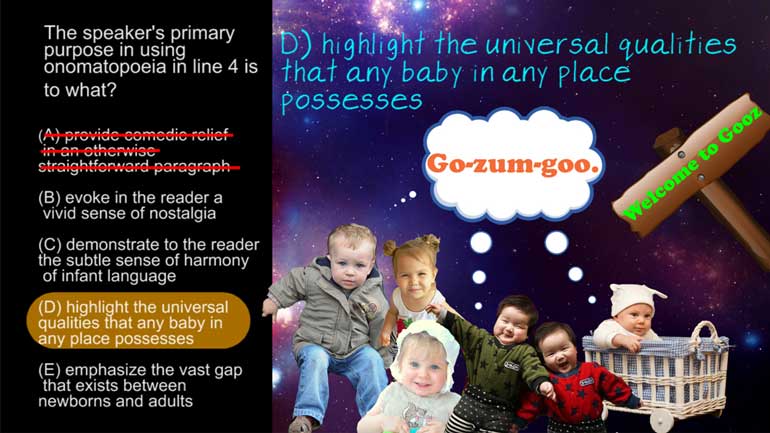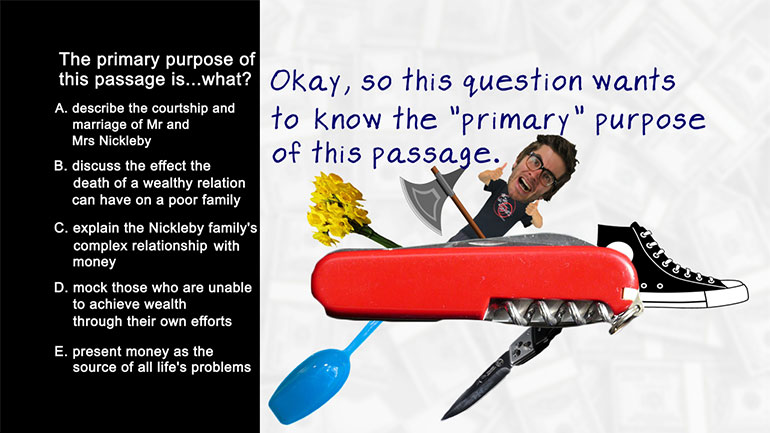ShmoopTube
Where Monty Python meets your 10th grade teacher.
Search Thousands of Shmoop Videos
AP English Language and Composition 2.7 Passage Drill 262 Views
Share It!
Description:
AP English Language and Composition 2.7 Passage Drill. The speaker's choice of syntax in the phrase, "he... guilt" (line 17) places most emphasis on which of the following words?
Transcript
- 00:00
[ musical flourish ]
- 00:03
And here's your Shmoop du jour, brought to you by Parliament.
- 00:06
Sort of like our Congress, but where laws can actually get passed.
- 00:10
Yeah.
- 00:11
Check out the passage again.
Full Transcript
- 00:13
Yeah, again. How many times have you read this?
- 00:18
Keep reading, keep reading... This is awful.
- 00:21
[ mumbles ]
- 00:27
Okay, let's go.
- 00:28
The speaker's choice of syntax in the phrase,
- 00:31
"he... guilt" (line 17)
- 00:34
places most emphasis on which of the following words?
- 00:38
And here are the potential answers.
- 00:39
[ mumbles ] Hmm.
- 00:42
All right, well, let's go.
- 00:43
Okay, so this question wants us to zero in on a particular
- 00:46
line and figure out what is being emphasized most.
- 00:49
Unfortunately, none of the words are italicized, so there goes that shortcut.
- 00:53
Well, here's the line they're citing, plus the one before it for a little context at no extra charge.
- 00:58
"He conjured them to think of the blood that would be shed,
- 01:02
and to remember that it would lie at their door;
- 01:05
they retorted the charge;
- 01:07
he was the aggressor and his would be the guilt."
- 01:11
All right. Rather than taking these five choices one by one,
- 01:14
let's dissect this thing a bit and figure out what it's saying.
- 01:17
"He conjured them to think of the blood that would be shed, and to remember that it would lie at their door."
- 01:22
So the king's warning the Houses about all the blood
- 01:25
that'd be spilled and that it would be in their neighborhood.
- 01:28
Not a good thing.
- 01:29
But then "they retorted the charge;"
- 01:32
(that is they came back with)
- 01:34
"he was the aggressor and his would be the guilt."
- 01:37
I.E. it was the king who started it,
- 01:40
so whatever nasty stuff went down,
- 01:42
he was the one who'd have to live with it.
- 01:44
In other words, the Houses are trying to take the blame
- 01:46
off their shoulders and put it on the king's.
- 01:49
Well, with that in mind, it seems like "he" and "his"
- 01:52
are the two most likely candidates here.
- 01:55
However, we give "his" the nod here because
- 01:58
"he was the aggressor" is more of a statement of fact,
- 02:01
while "his would be the guilt" is more of an accusation.
- 02:05
And people tend to emphasize accusations a bit more than facts.
- 02:08
So our answer is C.
- 02:10
And if we're wrong, well, we're just blaming the king.
- 02:12
[ whining ] [ evil laughter ]
Up Next
AP English Language and Composition: Passage Drill Drill 1, Problem 2. What is the speaker's primary purpose in using onomatopoeia in line four?
Related Videos
AP English Literature and Composition 1.1 Passage Drill 7. The primary purpose of this passage is what?
Wishing upon a star may help you pass your AP English Language and Composition test, but answering this question would be a safer bet.
Take a look at this shmoopy question and see if you can figure out which device the speaker employs the most.
Feel like shifting gears and answering a question about shifting tones? We've got you covered. Take a look at this question and see if you can foll...




